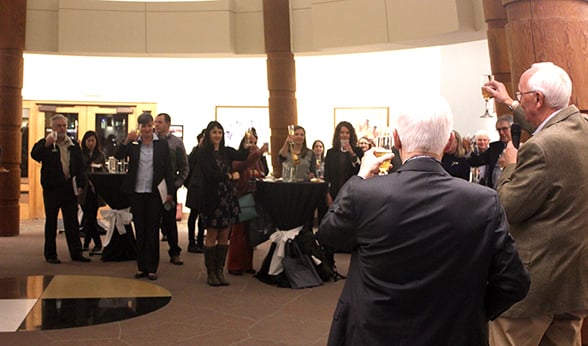Faculty, students, staff and friends of the Colorado School of Public Health (ColoradoSPH) gathered Nov. 28 for an annual event with a special twist. The “State of the School” address, led by Dean Jonathan Samet, MD, MS, included an acknowledgement and celebration of the school’s 10th anniversary.
As Samet noted, a “free” gift was on hand for attendees in the Nighthorse Campbell Native Health Building’s Shore Auditorium: an 86-page 10th anniversary magazine, titled with the school’s anniversary tagline, “Charting New Paths for a Healthier Future.” The publication’s 28 pieces highlight the school’s wide range of education, practice and research at the University of Colorado, Colorado State University, and the University of Northern Colorado.
“It’s a 10-year panorama of what has happened at the school,” Samet said, joking that after 409 days on the job, “I can still call myself a new dean.”
Past, present, future
 Attendees of the Colorado School of Public Health's 10th anniversary snapped up editions of the school's 10th anniversary magazine, "Charting New Paths for a Healthier Future."
Attendees of the Colorado School of Public Health's 10th anniversary snapped up editions of the school's 10th anniversary magazine, "Charting New Paths for a Healthier Future."
Samet used his presentation to engage his audience and to pivot between the past, the present and the future. A sheet of paper with three questions about what they would do to direct the future of the school awaited people at their seats, along with a decidedly old-school item.
Saying “I’ve given you a little bit of homework,” Samet held up a stubby pencil. “This is a pencil,” he jokingly said. “If you’re not sure how to use it, ask someone who is age-appropriate.”
With that, Samet briefly reviewed the history and progress of the public health field, noting that the number of public health degrees conferred in the United States has more than quadrupled over the last 25 years. Over the school’s first 10 years, ColoradoSPH has graduated a total of about 2,000 students, he added, with roughly 500 Master of Public Health (MPH) degree-seeking students currently enrolled.
Fast-growing field
“Public health has grown,” Samet said. “We’re part of that growth.”
He underscored the school’s commitment to its education mission with a quick review of a few of the many recent capstone projects and papers produced by students and graduates and a nod to new educations initiatives including a PhD program in Health Economics, an MPH concentration in Population Mental Health and Wellbeing, and several new public health certificate programs in Latino health, mental health and wellbeing, and applied biostatistics, as well as a developing certificate in American Indian and Alaska Native health.
[perfectpullquote align="right" bordertop="false" cite="" link="" color="" class="" size=""]
‘We need to have extended interactions with communities in new ways, some of them data-driven.’ – Dean Jonathan Samet
[/perfectpullquote]
Of course, a major goal of public health education is to get graduates into the field. Samet pointed out that 97 percent of the school’s graduates were employed or seeking further education within one year of receiving their degrees. He singled out the school’s Center for Public Health Practice, led by Cerise Hunt, PhD, for its initiatives in local, rural and regional public health workforce training programs – including 222 online and in-person trainings over the last year that have served more than 9,500 people.
A mix of funding from the National Institutes of Health (NIH) and other sources makes up $34.8 million to support research, another key component of the school’s mission. He also noted that private philanthropic support totaled more than $9 million in 2018, bolstering efforts in faculty recruitment, student scholarships and attention to public health policy.
Challenges ahead
Samet spent a good part of the session with an eye toward the next decade. Looking to the challenges facing public health professionals, Samet said that ongoing issues, including obesity, diabetes, mental health, substance use disorders and tobacco use, will continue to require close attention. But he added that “there are new things that are always emerging. That is the nature of public health.” He listed risks posed by oil and gas drilling, marijuana use, vaping and urbanization leading to the closing of rural hospitals as examples.
He also ticked off a number of “personal priorities,” including “advancing diversity” among the student body, increasing “synergies” across the three campuses and continuing to build close relationships with the people and public health officials across the state and region.
“We need to step back and say, ‘Does our university reflect the communities around us, the communities of need, the communities that we really want to focus on in advancing public health?’” Samet said.
Lively discussion
Through the talk, Samet encouraged back-and-forth discussions about the three questions he had posed for paper-and-pencil pondering. What would your highest priority be if you were Dean for the day? With a gift of $10 million to the school, what would be your priority areas for spending it? What are the two areas that need the most attention for strategic planning?
 Attendees of the State of the School address enjoyed a non-alcoholic celebratory toast to mark the 10th anniversary of the Colorado School of Public Health.
Attendees of the State of the School address enjoyed a non-alcoholic celebratory toast to mark the 10th anniversary of the Colorado School of Public Health.
The answers ranged widely: constructing a dedicated building for the school; increasing support for fellowships and scholarships; responding more aggressively to the social determinants of health; beefing up marijuana research; building relationships with incoming legislators; probing mental health issues; responding to the impacts of climate change – and more.
The conversation continued in this vein when Samet said he’d obtained an advance copy of the 20th anniversary magazine. “I’d like to show you a little bit of that,” he said, starting with an artist’s rendering of a brand-new ColoradoSPH building. “It might be a bit garish,” Samet conceded. But the publication-to-be also looked forward to what he called “Public Health 4.0,” the next generation of challenges for the field.
Public Health 4.0
“What will Public Health 4.0 be?” an audience member asked. Samet said he sees it resting on “two pedestals,” the first being the need to gather more and more data from increasingly sophisticated technology and figure out “the useful signals from that data.” Second, “We need to have extended interactions with communities in new ways, some of them data-driven. I think we will see that the public health community will recognize that a lot of the things we do are going to require greater engagement with communities.”
Before adjourning to the auditorium lobby for a non-alcoholic celebratory toast, Samet received a folded American flag, encased in glass, from Jamila Bryant, a 2017 graduate of the school’s MPH program at Colorado State University. Bryant, a Master Sergeant in the U.S. Air Force Reserves, recently served a six-month deployment to the Al Dhafra Air Base in the United Arab Emirates. The flag she presented to the ColoradoSPH was flown on Feb. 22, 2018, during a mission in support of Operation Inherent Resolve.
Guest contributor: Story written by Tyler Smith. Photos by Brett McPherson.




